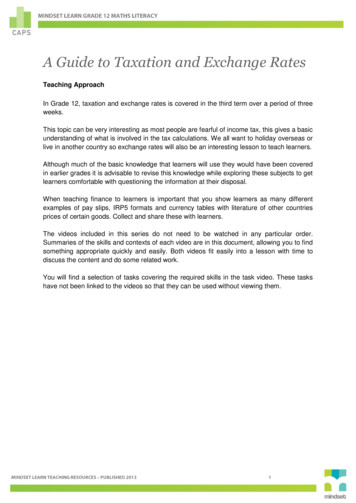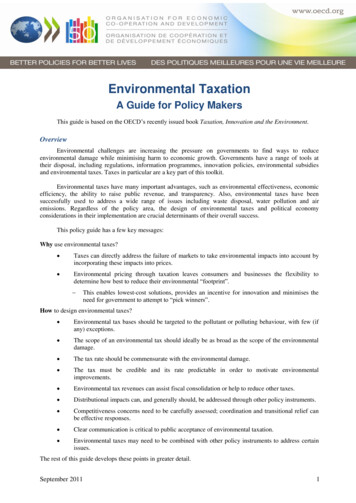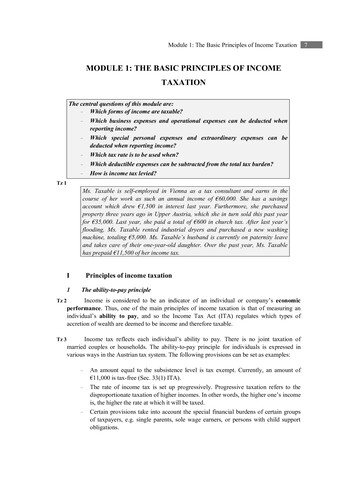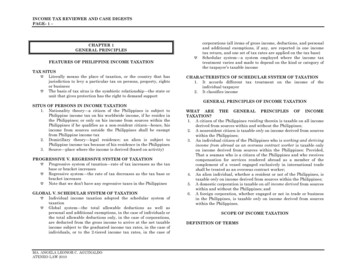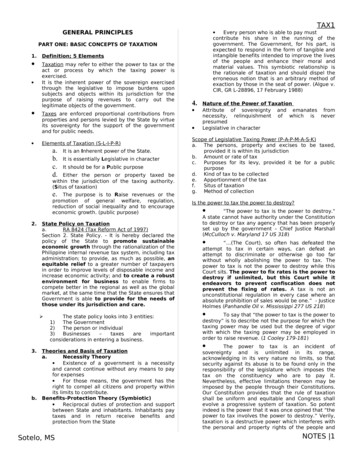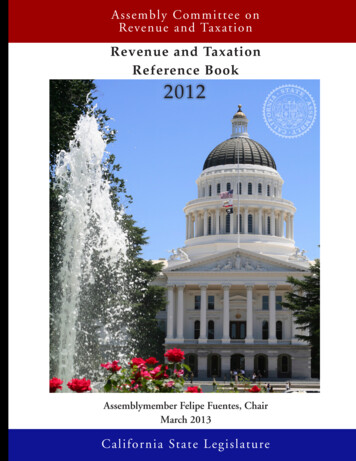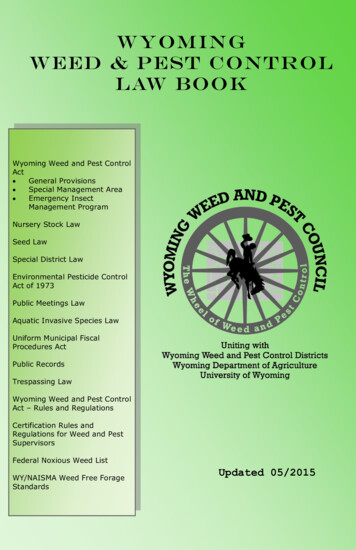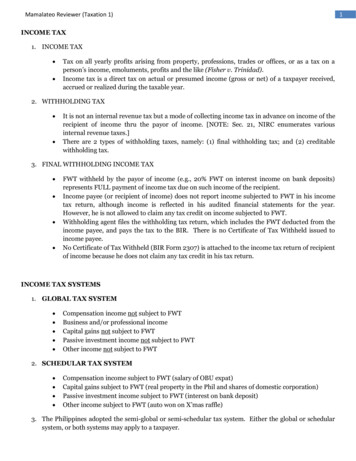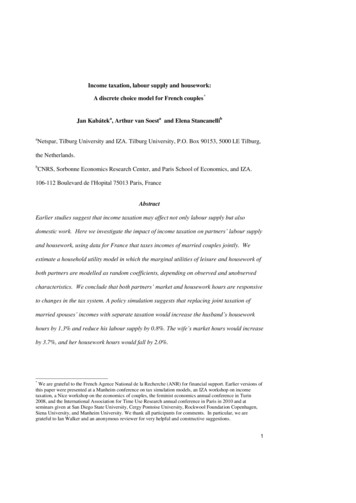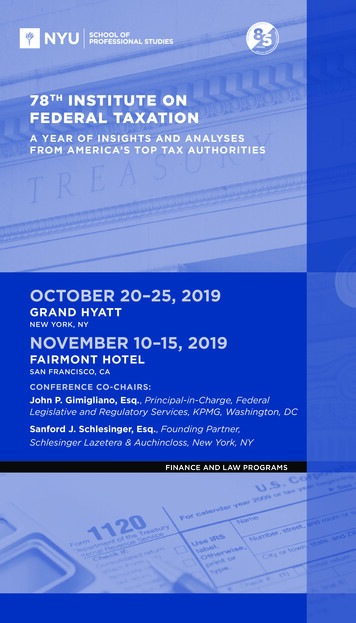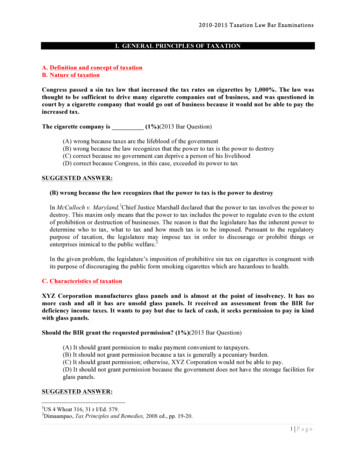
Transcription
2010-2015 Taxation Law Bar ExaminationsI. GENERAL PRINCIPLES OF TAXATIONA. Definition and concept of taxationB. Nature of taxationCongress passed a sin tax law that increased the tax rates on cigarettes by 1,000%. The law wasthought to be sufficient to drive many cigarette companies out of business, and was questioned incourt by a cigarette company that would go out of business because it would not be able to pay theincreased tax.The cigarette company is (1%)(2013 Bar Question)(A) wrong because taxes are the lifeblood of the government(B) wrong because the law recognizes that the power to tax is the power to destroy(C) correct because no government can deprive a person of his livelihood(D) correct because Congress, in this case, exceeded its power to taxSUGGESTED ANSWER:(B) wrong because the law recognizes that the power to tax is the power to destroyIn McCulloch v. Maryland,1Chief Justice Marshall declared that the power to tax involves the power todestroy. This maxim only means that the power to tax includes the power to regulate even to the extentof prohibition or destruction of businesses. The reason is that the legislature has the inherent power todetermine who to tax, what to tax and how much tax is to be imposed. Pursuant to the regulatorypurpose of taxation, the legislature may impose tax in order to discourage or prohibit things orenterprises inimical to the public welfare.2In the given problem, the legislature’s imposition of prohibitive sin tax on cigarettes is congruent withits purpose of discouraging the public form smoking cigarettes which are hazardous to health.C. Characteristics of taxationXYZ Corporation manufactures glass panels and is almost at the point of insolvency. It has nomore cash and all it has are unsold glass panels. It received an assessment from the BIR fordeficiency income taxes. It wants to pay but due to lack of cash, it seeks permission to pay in kindwith glass panels.Should the BIR grant the requested permission? (1%)(2013 Bar Question)(A) It should grant permission to make payment convenient to taxpayers.(B) It should not grant permission because a tax is generally a pecuniary burden.(C) It should grant permission; otherwise, XYZ Corporation would not be able to pay.(D) It should not grant permission because the government does not have the storage facilities forglass panels.SUGGESTED ANSWER:12US 4 Wheat 316, 31 r I/Ed. 579.Dimaampao, Tax Principles and Remedies, 2008 ed., pp. 19-20.1 P a g e
2010-2015 Taxation Law Bar Examinations(B) It should not grant permission because a tax is generally a pecuniary burden.This principle is one of the attributes or characteristics of tax.3D. Power of taxation compared with other powers1. Police power2. Power of eminent domainE. Purpose of taxation1. Revenue-raising2. Non-revenue/special or regulatoryMoney collected from taxation shall not be paid to any religious dignitary EXCEPT when: (2011Bar Question)(A) the religious dignitary is assigned to the Philippine Army(B) it is paid by a local government unit(C) the payment is passed in audit by the COA(D) it is part of a lawmaker’s pork barrelSUGGESTED ANSWER:(A) the religious dignitary is assigned to the Philippine ArmyF. Principles of sound tax system1.Fiscal adequacy2.Administrative feasibility3.Theoretical justiceAnne Lapada, a student activist, wants to impugn the validity of a tax on text messages. Aside fromclaiming that the law adversely affects her since she sends messages by text, what may she allegethat would strengthen her claim to the right to file a taxpayer’s suit? (2011 Bar Question)(A) That she is entitled to the return of the taxes collected from her in case the court nullifies thetax measure.(B) That tax money is being extracted and spent in violation of the constitutionally guaranteedright to freedom of communication.(C) That she is filing the case in behalf of a substantial number of taxpayers.(D) That text messages are an important part of the lives of the people she represents.SUGGESTED ANSWER:(B) That tax money is being extracted and spent in violation of the constitutionallyguaranteed right to freedom of communication.Real property taxes should not disregard increases in the value of real property occurring over along period of time. To do otherwise would violate the canon of a sound tax system referred to as:(2011 Bar Question)3Benjamin B. Aban, Law of Basic Taxation in the Philippines (Revised Ed.), p. 2, citing 1 Cooley 63.2 P a g e
2010-2015 Taxation Law Bar Examinations(A) theoretical justice.(B) fiscal adequacy.(C) administrative feasibility.(D) symbiotic relationship.SUGGESTED ANSWER:(B) fiscal adequacyExplain the principles of a sound tax system. (2015 Bar Question)SUGGESTED ANSWER:The principles of a sound tax system are the following:a. Fiscal adequacy which means that the sources of revenue should be sufficient to meet thedemands of public expenditures;b. Equality or theoretical justice which means that the tax burden should be proportionate tothe taxpayer’s ability to pay (this is the so-called ability to pay principle); andc. Administrative feasibility which means that the tax law should be capable ofconvenience, just and effective administration.G. Theory and basis of taxation1. Lifeblood theoryWhich statement below expresses the lifeblood theory? (2012 Bar Question)a) The assessed taxes must be enforced by the government.b) The underlying basis of taxation is government necessity, for without taxation, a governmentcan neither exist nor endure;c) Taxation is an arbitrary method of exaction by those who are in the seat of power;d) The power of taxation is an inherent power of the sovereign to impose burdens upon subjectsand objects within its jurisdiction for the purpose of raising revenues.SUGGESTED ANSWER:b) The underlying basis of taxation is government necessity, for without taxation, agovernment can neither exist nor endureTaxes are the lifeblood of the government, for without taxes, the government can neither exist norendure. A principal attribute of sovereignty, the exercise of taxing power derives its source fromthe very existence of the state whose social contract with its citizens obliges it to promote publicinterest and common good. The theory behind the exercise of the power to tax emanates fromnecessity; without taxes, government cannot fulfill its mandate of promoting the general welfareand well-being of the people. (National Power Corporation vs. City of Cabanatuan)2. Necessity theory3. Benefits-protection theory (Symbiotic relationship)4. Jurisdiction over subject and objects3 P a g e
2010-2015 Taxation Law Bar ExaminationsWhich theory in taxation states that without taxes, a government would be paralyzed for lack ofpower to activate and operate it, resulting in its destruction? (2011 Bar Question)(A) Power to destroy theory(B) Lifeblood theory(C) Sumptuary theory(D) Symbiotic doctrineSUGGESTED ANSWER:(B) Lifeblood theoryThe power to tax is the power to destroy. Is this always so? (2011 Bar Question)(A) No. The Executive Branch may decide not to enforce a tax law which it believes to beconfiscatory.(B) Yes. The tax collectors should enforce a tax law even if it results to the destruction of theproperty rights of a taxpayer.(C) Yes. Tax laws should always be enforced because without taxes the very existence of theState is endangered.(D) No. The Supreme Court may nullify a tax law, hence, property rights are not affected.SUGGESTED ANSWER:(D) No. The Supreme Court may nullify a tax law, hence, property rights are not affected.H. Doctrines in taxation1. Prospectivity of tax laws2. Imprescriptibility3. Double taxationChoose the correct answer. Double Taxation - (1%)(A) is one of direct duplicate taxations wherein two (2) taxes must be imposed on the samesubject matter, by the same taxing authority, within the same jurisdiction, during the sameperiod, with the same kind or character of tax, even if the purposes of imposing the sameare different.(B) is forbidden by law; and therefore, it is a valid defense against the validity of a taxmeasure.(C) means taxing the same property twice when it should be taxed only once; it istantamount to taxing the same person twice by the same jurisdiction for the same thing.(D) exists when a corporation is assessed with local business tax as a manufacturer, and atthe same time, value-added tax as a person selling goods in the course of trade or business.(2014 Bar Question)SUGGESTED ANSWER :A. Double taxation is one of direct duplicate taxations wherein two (2) taxes must be imposedon the same subject matter, by the same taxing authority, within the same jurisdiction, during4 P a g e
2010-2015 Taxation Law Bar Examinationsthe same period, with the same kind of character of tax, even if the purposes of imposing thesame are different.a) Strict senseDifferentiate between double taxation in the strict sense and in a broad sense and give an exampleof each. (2015 Bar Question)SUGGESTED ANSWER:Double taxation in the strict sense pertains to the direct double taxation. This means that thetaxpayer is taxed twice by the same taxing authority, within the same taxing jurisdiction, for the sameproperty and same purpose.On the other hand, double taxation in broad sense pertains to indirect double taxation. Thisextends to all cases in which there is a burden of two or more impositions. It is the double taxation otherthan those covered by direct double taxation.b) Broad sensec) Constitutionality of double taxationd) Modes of eliminating double taxationIn 2009, Caruso, a resident Filipino citizen, received dividend income from a U.S.-basedcorporation which owns a chain of Filipino restaurants in the West Coast, U.S.A. The dividendremitted to Caruso is subject to U.S. withholding tax with respect to a non-resident alien likeCaruso.a. What will be your advice to Caruso in order to lessen the impact of possible double taxationon the same income?b. Would your answer in A. be the same if Caruso became a U.S. immigrant in 2008 and hadbecome a non-resident Filipino citizen? Explain the difference in treatment for Philippineincome tax purposes.(2010 Bar Question)SUGGESTED ANSWER:a. Caruso has the option either to claim the amount of the income tax withheld in US as adeduction from his gross income in the Philippines or to claim it as a tax credit.b. No. The income from abroad of a non-resident citizen is exempt from the Philippine incometax. There is no international double taxation on the said income.Bank A deposit money with Bank B which earns interest that is subjected to the 20% finalwithholding tax. At the same time, Bank A is subjected to the 5% gross receipts tax on its interestincome on loan transactions to customers. Which statement below INCORRECTLY describes thetransaction? (2012 Bar Question)5 P a g e
2010-2015 Taxation Law Bar Examinationsa) There is double taxation because two taxes – income tax and gross receipts tax are imposed onthe interest incomes described above and double taxation is prohibited under the 1987Constitutionb) There is no double taxation because the first tax is income tax, while the second tax is businesstax;c) There is no double taxation because the income tax is on the interest income of Bank A on itsdeposits with Bank B (passive income), while the gross receipts tax is on the interest incomereceived by Bank A from loans to its debtor-customers (active income);d) Income tax on interest income of deposits of Bank A is a direct tax, while GRT on interestincome on loan transaction is and tax.SUGGESTED ANSWER:a) There is double taxation because two taxes – income tax and gross receipts tax areimposed on the interest incomes described above and double taxation is prohibited underthe 1987 ConstitutionThere is no double taxation if the law imposes two different taxes on the same income, businessor property. First, the taxes herein are imposed on two different subject matters. The subjectmatter of the FWT [Final Withholding Tax] is the passive income generated in the form ofinterest on deposits and yield on deposit substitutes, while the subject matter of the GRT [GrossReceipts Tax] is the privilege of engaging in the business of banking. Second, although both taxesare national in scope because they are imposed by the same taxing authority - the nationalgovernment under the Tax Code - and operate within the same Philippine jurisdiction for thesame purpose of raising revenues, the taxing periods they affect are different. The FWT isdeducted and withheld as soon as the income is earned, and is paid after every calendar quarter inwhich it is earned. On the other hand, the GRT is neither deducted nor withheld, but is paid onlyafter every taxable quarter in which it is earned. (Commissioner of Internal Revenue vs. BPI, G.R.No. 147375)Double taxation in its general sense means taxing the same subject twice during the same taxingperiod. In this sense, double taxation: (2011 Bar Question)(A) violates substantive due process.(B) does not violate substantive due process.(C) violates the right to equal protection.(D) does not violate the right to equal protection.SUGGESTED ANSWER:(C) violates the right to equal protection.Mr. Alas sells shoes in Makati through a retail store. He pays the VAT on his gross sales to the BIRand the municipal license tax based on the same gross sales to the City of Makati. He comes to youfor advice because he thinks he is being subjected to double taxation.What advice will you give him? (1%)(2013 Bar Question)6 P a g e
2010-2015 Taxation Law Bar Examinations(A) Yes, there is double taxation and it is oppressive.(B) The City of Makati does not have this power.(C) Yes, there is double taxation and this is illegal m the Philippines.(D) Double taxation is allowed where one tax is imposed by the national government and theother by the local government.SUGGESTED ANSWER:(D) Double taxation is allowed where one tax is imposed by the national government and theother by the local government.There is double taxation when one tax is imposed by the national government and the other isimposed by a local government unit.4 However, the 1987 Constitution does not forbid doubletaxation. In Pepsi-Cola Bottling Company of the Philippines, Inc. v. Municipality of Tanauan(G.R. No. L-31156, February 27, 1976), the Supreme Court declared that double taxation doesnot violate the uniformity rule nor does it infringe the equal protection guarantee just because onetax is imposed by the national government and the other tax is levied by a local government unit.4. Escape from taxationa) Shifting of tax burden(i) Ways of shifting the tax burden(ii) Taxes that can be shifted(iii) Meaning of impact and incidence of taxationb) Tax avoidanceChoose the correct answer. Tax Avoidance (A) is a scheme used outside of those lawful means and, when availed of, it usually subjectsthe taxpayer to further or additional civil or criminal liabilities.(B) is a tax saving device within the means sanctioned by law.(C) is employed by a corporation, the organization of which is prompted more on themitigation of tax liabilities than for legitimate business purpose.(D) is any form of tax deduction scheme, regardless if the same is legal or not. (2014 BarQuestion)SUGGESTED ANSWER :B. Tax avoidance is a tax-saving device within the means sanctioned by law.c) Tax evasionYou are the retained tax counsel of ABC Corp. Your client informed you that they have beendirectly approached with a proposal by a BIR insider (i.e., a middle rank BIR official) on the taxmatter they have referred to you for handling. The BIR insider's proposal is to settle the matter bysignificantly reducing the assessment, but he will get 50% of the savings arising from the reducedassessment.4Dimaampao, Tax Principles and Remedies, 2008 ed., p. 1277 P a g e
2010-2015 Taxation Law Bar ExaminationsWhat tax, criminal and ethical considerations will you take into account in giving your advice?Explain the relevance of each of these considerations. (2013 Bar Question)SUGGESTED ANSWER:As a lawyer, I have the responsibility to give only a lawful advice. Canon I of the Code ofProfessional Responsibility mandates me to “uphold the Constitution, obey the laws of the land andpromote respect for law and legal processes. Rule 1.01 states that “a lawyer shall not engage in unlawful,dishonest, immoral or deceitful conduct.” Rule 1.02 provides that “a lawyer shall not counsel or abetactivities aimed at defiance of the law or at lessening confidence in the legal system.”Therefore, I will advise my client not to agree with the proposal of the BIR officer. Agreeing withthe proposal will result in criminal prosecution under the following laws:Under the NIRC, the officers of the board who authorized the tax evasion will be liable underSection 253(C), while the corporation shall be liable under Section 256.The BIR official is liable under Section 269 which provides for the violations committed bygovernment enforcement officers. Paragraph (d) of Section 269 provides that one of these violations is“offering or undertaking to accomplish, file or submit a report or assessment on a taxpayer without theappropriate examination of the books of accounts or tax liability, or offering or undertaking to submit areport or assessment less than the amount due the Government for any consideration or compensation, orconspiring or colluding with another or others to defraud the revenues or otherwise violate the provisionsof this Code.”Under the Revised Penal Code, the officers of the corporation shall be liable under Article 212 forcorruption of public officials while the BIR official is liable for direct bribery.Both my client and the BIR official will also be liable under Republic Act No. 3019 or the AntiGraft and Corrupt Practices Act.On August 31, 2014, Haelton Corporation (HC), thru its authorized representative Ms. Pares, solda 16-storey commercial building known as Haeltown Building to Mr. Belly for P100 million. Mr.Belly, in turn, sold the same property on the same day to Bell Gates, Inc. (BGI) for P200 million.These two (2) transactions were evidenced by two (2) separate Deeds of Absolute Sale notarized onthe same day by the same notary public.Investigations by the Bureau of Internal Revenue (BIR) showed that:(1) the Deed of Absolute Sale between Mr. Belly and BGI was notarized ahead of the sale betweenHC and Mr. Belly; (2) as early as May 17, 2014, HC received P40 million from BGI, and not fromMr. Belly; (3) the said payment of P40 million was recorded by BGI in its books as of June 30, 2014as investment in Haeltown Building; and (4) the substantial portion of P40 million was withdrawnby Ms. Pares through the declaration of cash dividends to all its stockholders.Based on the foregoing, the BIR sent Haeltown Corporation a Notice of Assessment for deficiencyincome tax arising from an alleged simulated sale of the aforesaid commercial building to escapethe higher corporate income tax rate of thirty percent (30%). What is the liability of HaeltownCorporation, if any? (2014 Bar Question)SUGGESTED ANSWER :8 P a g e
2010-2015 Taxation Law Bar ExaminationsThe tax planning scheme adopted by Haeltown Corporation constitutes tax evasion. According toCIR v. Estate of Benigno Toda (G.R. No. 147188, September 14, 2004), a transaction where a taxpayermade it appear that there were two sales of the property was considered “tainted with fraud.” The solepurpose of acquiring and transferring title of the property on the same day was to create a tax shelter. Thesale to Mr. Belly (which is subject to individual capital gains tax) was to mislead the BIR and avoid thehigher corporate income tax.5. Exemption from taxationa) Meaning of exemption from taxationb) Nature of tax exemptionc) Kinds of tax exemption(i) Express(ii) Implied(iii) Contractuald) Rationale/grounds for exemptione) Revocation of tax exemption6. Compensation and set-off7. Compromise8. Tax amnestya) Definitionb) Distinguished from tax exemptionWhich of the following are NOT usually imposed when there is a tax amnesty? (2011 Bar Question)(A) Civil, criminal, and administrative penalties(B) Civil and criminal penalties(C) Civil and administrative penalties(D) Criminal and administrative penaltiesSUGGESTED ANSWER:(A) Civil, criminal, and administrative penalties9. Construction and interpretation of:a) Tax laws(i) General rule(ii) Exceptionb) Tax exemption and exclusion(i) General rule(ii) Exceptionc) Tax rules and regulations(i) General rule onlyd) Penal provisions of tax lawse) Non-retroactive application to taxpayers(i) ExceptionsWhich of the following statement is NOT correct? (2012 Bar Question)9 P a g e
2010-2015 Taxation Law Bar Examinationsa) In case of doubt, statutes levying taxes are constructed strictly the government;b) The construction of a statute made by his predecessors is not binding upon the successor, ifthereafter he becomes satisfied that a different construction should be given;c) The reversal of a ruling shall not generally be given retroactive application, if said reversal willbe prejudicial to the taxpayer;d) A memorandum circular promulgated by the CIR that imposes penalty for violations of certainrules need not be published in a newspaper of general circulation or official gazette because it hasthe force and effect of law.SUGGESTED ANSWER:d) A memorandum circular promulgated by the CIR that imposes penalty for violations ofcertain rules need not be published in a newspaper of general circulation or official gazettebecause it has the force and effect of law.A revenue memorandum circular shall not begin to be operative until after due noticethereof maybe fairly presumed. (Commissioner of Internal Revenue vs. Philippine Airlines,G.R. No. 180066, July 8, 2009)The BIR, through the Commissioner, instituted a system requiring taxpayers to submit to the BIR asummary list of their sales and purchases during the year, indicating the name of the seller or thebuyer and the amount. Based on these lists, the BIR discovered that in 2004 ABC Corp. purchasedfrom XYZ Corp. goods worthP5,000,000. XYZ Corp. did not declare these for income tax purposesas its reported gross sales for 2004was only Pl,000,000.Which of the following defenses may XYZ Corp. interpose in an assessment against it by the BIR?(1%)(2013 Bar Question)(A) The BIR has no authority to obtain third party information to assess taxpayers.(B) The third party information is inadmissible as hearsay evidence.(C) The system of requiring taxpayers to submit third party information is illegal for violating theright to privacy.(D) None of the above.SUGGESTED ANSWER:(D) None of the above.Section 6(B) of the NIRC authorizes the Commissioner to assess the property tax due from ataxpayer when he believes that the report the taxpayer submitted is false, incomplete, orerroneous. The same provision authorizes the Commissioner to amend the return from his ownknowledge and from such information he can obtain through testimony or otherwise, which isdeemed prima facie correct and sufficient for all legal purposes.I. Scope and limitation of taxation1. Inherent limitationsa) Public purposeb) Inherently legislative(i) General rule(ii) Exceptions10 P a g e
2010-2015 Taxation Law Bar Examinations(a) Delegation to local governments(b) Delegation to the President(c)Delegation to administrative agenciesWhich statement is WRONG? (2012 Bar Question)a) The power of taxation may be exercised by the government, its political subdivisions, andpublic utilities;b) Generally, there is no limit on the amount of tax that may be imposed;c) The money contributed as tax becomes part of the public funds;d) The power of tax is subject to certain constitutional limitations.SUGGESTED ANSWER:a) The power of taxation may be exercised by the government, its political subdivisions, andpublic utilitiesInherent Powers of the State.c) Territorial(i) Situs of taxation(a) MeaningWhich among the following concepts of taxation is the basis for the situs of income taxation? (2011Bar Question)(A) Lifeblood doctrine of taxation(B) Symbiotic relation in taxation(C) Compensatory purpose of taxation(D) Sumptuary purpose of taxationSUGGESTED ANSWER:(B) Symbiotic relation in taxation(b) Situs of income tax(1) From sources within the PhilippinesGuidant Resources Corporation, a corporation registered in Norway, has a 50 MW electric powerplant in San Jose, Batangas. Aside from Guidant's income from its power plant, which among thefollowing is considered as part of its income from sources within the Philippines? (2011 BarQuestion)(A) Gains from the sale to an Ilocos Norte power plant of generators bought from the UnitedStates.(B) Interests earned on its dollar deposits in a Philippine bank under the Expanded ForeignCurrency Deposit System.(C) Dividends from a two-year old Norwegian subsidiary with operations in Zambia but derives60% of its gross income from the Philippines.(D) Royalties from the use in Brazil of generator sets designed in the Philippines by its engineers.11 P a g e
2010-2015 Taxation Law Bar ExaminationsSUGGESTED ANSWER:(A) Gains from the sale to an Ilocos Norte power plant of generators bought from theUnited States.(2) From sources without the PhilippinesTriple Star, a domestic corporation, entered into a Management Service Contract with Single Star,a non-resident foreign corporation with no property in the Philippines. Under the contract, SingleStar shall provide managerial services for Triple Star’s Hongkong branch. All said services shall beperformed in Hongkong.Is the compensation for the services of Single Star taxable as income from sources within thePhilippines? Explain. (2014 Bar Question)SUGGESTED ANSWER :No. Pursuant to the case of Commissioner of Internal Revenue v. Baier-Nickel (G.R. No. 153793,August 29, 2006), the factor which determines the source of income for personal services is the placewhere the services were actually rendered. Since Single Star, a non-resident foreign corporation, willperform all the managerial services for Triple Star’s branch in Hong Kong, all compensation incomearising from the performance of such services will be considered income from sources outside thePhilippines, and therefore not subject to Philippine income tax.(3) Income partly within and partly without the Philippines(c) Situs of property taxes(1) Taxes on real property(2) Taxes on personal property(d) Situs of excise tax(1) Estate tax(2) Donor’s tax(e) Situs of business tax(1) Sale of real property(2) Sale of personal property(3) Value-Added Tax (VAT)d) International comitye) Exemption of government entities, agencies, and instrumentalities2. Constitutional limitationsa) Provisions directly affecting taxation(i) Prohibition against imprisonment for non-payment of poll tax(ii) Uniformity and equality of taxation12 P a g e
2010-2015 Taxation Law Bar ExaminationsVII. The municipality of San Isidro passed an ordinance imposing a tax on installation managers.At that time, there was only one installation manager in the municipality; thus, only he would beliable for the tax.Is the law constitutional? (1%)(2013 Bar Question)(A) It is unconstitutional because it clearly discriminates against this person.(B) It is unconstitutional for lack of legal basis.(C) It is constitutional as it applies to all persons in that class.(D) It is constitutional because the power to tax is the power to destroy.SUGGESTED ANSWER:(C) It is constitutional as it applies to all persons in that class.The ordinance imposing tax on installation managers does not violate the equal protection clauseunder Section 1, Article III of the Constitution and the uniformity rule under Section 28, ArticleVI of the Constitution. The equal protection clause simply means that all persons subject tolegislation shall be treated alike under like circumstances and conditions both in privilegesconferred and liabilities imposed. On the other hand, the uniformity rule states that a tax isuniform when it operates with the same force and effect in every place where the subject of it isfound. It does not signify an intrinsic but simply a geographical uniformity. (See: BritishAmerican Tobacco v. Camacho, G.R. No. 163583, April 15, 2009)In the given problem, the ordinance applies to all installation manager. In other words, theordinance does not specifically identify who among the installation managers shall be liable fortax. The fact that there is only one installation manager in the municipality does not mean that thetaxing authority singled him out as the only taxable person.Choose the correct answer. Tax laws - (1%)(A) may be enacted for the promotion of private enterprise or business for as long as it givesincidental advantage to the public or the State(B) are inherently legislative; therefore, may not be delegated(C) are territorial in nature; hence, they do not recognize the generally-accepted tenets ofinternational law(D) adhere to uniformity and equality when all taxable articles or kinds of property of thesame class are taxable at the same rate (2014 Bar Question)SUGGESTED ANSWER :D. Tax laws adhere to uniformity and equality when all taxable articles or kinds of property of thesame class are taxable at the same rate.(iii) Grant by Congress of authority to the president to impose tariff rates(iv) Prohibition against taxation of religious, charitable entities, and educational entitiesWhat is the rule on the taxability of income that a government educational institution derives fromits school operations? Such income is: (2011 Bar Question)(A) subject to 10% tax on its net taxable income as if it is a proprietary educational institution.13 P a g e
2010-2015 Taxation Law Bar Examinations(B) Exempt from income taxation if it is actually, directly, and exclusively used for educationalpurposes.(C) subject to the ordinary income tax rates with respect to incomes derived from educationalactivities.(D) Exempt from income taxation in
2010-2015 Taxation Law Bar Examinations 6 Page a) There is double taxation because two taxes - income tax and gross receipts tax are imposed on
